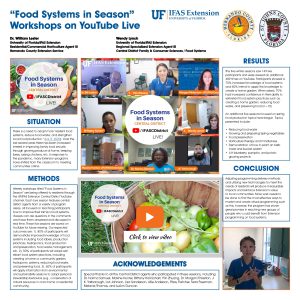2022 – Central District All Faculty Symposium – Family and Consumer Sciences (FCS)
W. Lester, UF/IFAS Extension, Hernando County, Brooksville, FL and W. Lynch, UF/IFAS Extension, St. Johns County, St. Augustine, FL.
Situation: There is a need to adopt more “resilient food systems, reduce food waste, and strengthen local food production” (Lal, R. 2020). In recent years there has been increasing interest in improving family food security through home vegetable gardening, keeping bees, raising chickens, etc. (Alton & Ratnieks, 2021; Charlebois, et al, 2021; Halvey, et al, 2021); however, changing the food system requires “education to support consumers in adopting sustainable behaviors” (Weber, et al, 2020). Objectives: 1. 80% will demonstrate improved knowledge of food systems including food production practices, hydroponics, safe storage, and preparation methods. 2. 50% will adopt self‐reliant food system practices, including creating a home or community garden, hydroponic systems, prepare seasonal produce, and reduce food waste. 3. 60% will adopt personal stewardship behaviors. Methods: Weekly workshops, Food Systems in Season, were offered through the UF/IFAS Extension Central District YouTube channel. Each session featured central district agents from a variety of program areas, focusing on teaching participants steps to improve their family’s food systems. Viewers could engage in the comments and have questions answered during the live session. The sessions are recorded and available on YouTube for future viewing. Results: The five winter sessions had 149 live YouTube participants and were viewed an additional 599 times. Survey respondents reported a 70% increased knowledge of food systems and 60% intend to create a home garden. 70% had increased confidence in their ability to implement self‐reliant food system practices including creating a home garden, reducing food waste, and food handling (n=10). Adoption will be measured in a post series, 3-month follow-up survey. Conclusion: Food Systems in Season utilized new technologies for online program delivery and multidisciplinary collaborations; demonstrating positive outcomes which may lead to a more resilient food system within our Central District communities.
 0
0

